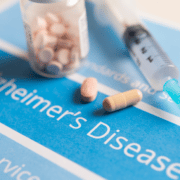New Alzheimer’s Drug Cuts Symptoms by 30 Percent, New Study Says
Researchers are excited by the results of a new Alzheimer’s drug—delivered in the form of twice weekly infusions—which appears to slash symptoms nearly 30 percent in about 18 months of usage. This breakthrough could help to improve millions of individuals living with Alzheimer’s both in the United States and across the world.
“This is an unambiguously statistically positive result and represents something of an historic moment when we see the first convincing modification of Alzheimer’s disease,” Rob Howard, PhD, a professor of old age psychiatry at University College London (UCL), as reported in The Guardian. “God knows, we’ve waited long enough for this.”
New Alzheimer’s Drug Lecanemab Show Promise and Provides Clues
The drug companies Eisai and Biogen recently announced results their phase 3, 18-month clinical trial involving the Alzheimer’s drug lecanemab, which is classified as an anti-amyloid antibody treatment. The data shows that lecanemab slowed the rate of the decline in cognition by 27 percent in patients with early stage Alzheimer’s. Moreover, experts say the trial’s success sheds more light on how Alzheimer’s disease may develop and progress.
One theory, called “amyloid hypothesis,” postulates that a sticky compound disrupting communication between brain cells and eventually kills them. “Some researchers believe that flaws in the processes governing production, accumulation or disposal of beta-amyloid are the primary cause of Alzheimer’s,” explains a report from the Alzheimer’s Association.
Researchers caution that some trial participants did experience side effects of the new Alzheimer’s drug. Roughly 21 percent of study subjects reported adverse effects as opposed to nine percent of those taking a placebo. 3 percent of patients experienced brain swelling or brain bleeding according to PET scans.
With more time beyond the 18-month trial period, researchers believe that more benefits may take effect. The National Institute on Health (NIH) is currently funding two additional trials which in order to evaluate people that are NOT diagnosed with dementia but have varying amounts of amyloid brain deposits. In other words, they hope to see whether or not the new Alzheimer’s drug can slow the rate of cognitive decline in people who are asymptomatic.
When is the New Alzheimer’s Drug Available?
Eisai and Biogen have announced that they plan to file for traditional approval for the drug in the U.S. by Mar. 2023. To learn more about interventions and treatments that are currently available to improve dementia and Alzheimer’s symptoms, please see your healthcare provider.
Learn more about our Memory Care program >
Read also this article about the possible Alzheimer’s vaccine nasal spray >





